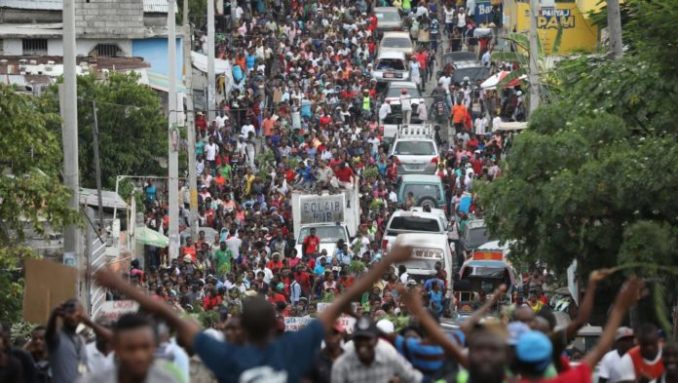
By Joseph Rosen
Waves of popular uprisings have been roiling Haitian society for months. Workers, peasants, teachers and students have taken to the streets to oppose the corrupt U.S. backed oligarchy in control of their government. The last upsurge in protests began on Nov. 18, marking the anniversary of the Battle of Vertières which decided the hard-won war for Haitian independence in 1803. For several days, workers across the country mounted a general strike. The streets have surged with hundreds of thousands of people fed-up with a government that has not only ignored their needs but has met their protests with lethal violence.
The most recent mobilizations have centered around the embezzlement of as much as $3.8 billion dollars in public funds by government elites since 2008. There are obvious reasons that so many have rallied against the injustice of the stolen public funds. While Haiti’s bourgeoisie and their crony bureaucrats have been taking vacations to Miami, less than half of the Haitian population has access to potable water. The masses of Haitians are still struggling to rebuild basic infrastructure after the devastating earthquake of 2010. The funds could have been used to meet the dire needs of the Haitian people, one in four of whom lack access to sanitation.
In fact, the so-called PetroCaribe funds in question were intended for development, for the construction of much needed infrastructure and social programs as part of an accord with oil-rich Venezuela under the leadership of Hugo Chavez. This deal reflects a longstanding historical bond of solidarity with Venezuela. In 1816, the young republic of Haiti lent arms and aid to Simon Bolivar and his army in their fight for independence from Spain on the condition that slavery be abolished in the founding of Venezuela. In 2017, the PetroCaribe program was halted due to the imposition of financial sanctions on Venezuela by the Trump administration.
Acts of international solidarity fly in the face of U.S. rulers who have sought to undermine the popular will of the Haitians and the Venezuelans ever since this country was founded by wealthy slaveowners. For more than two hundred years, the U.S. has been relentless in its attempts to keep Haiti as a colony where low wage workers would produce goods for export, up through the bloody coups that removed the last popular government of Jean-Bertrand Aristide in 2004. Even today many Haitians work in sweatshops for an average of $3 a day to produce textiles and garments for U.S. companies.
The current U.S. backed government of President Jovenel Moïse as well as the government of his predecessor Michel Martelly are both implicated in the theft of billions. Some in the streets are still calling for an accounting of the lost funds. An increasing number are learning through struggle that this demand is akin to asking a thief to arrest himself. Fanmi Lavalas, the party of Jean-Bertrand Aristide, is calling to remove Moïse, his ministers, and to establish a transitional government. In their indifference to the suffering of Haitian masses, Moïse and his government have become more an enemy of the people by the day.
As repression grows more brutal, the masses are awakening to the need for a complete overhaul of the state. The Haitian National Police have killed a mounting number of protesters. More troublingly, there have been reports of killings carried out by paramilitary forces, recalling the death squads of the U.S. backed Duvalier regime. On November 13, mercenaries carried out a massacre of dozens in the La Saline neighborhood near Port au Prince; images of the brutal aftermath have fueled the outrage of the anti-government opposition. Among the National Police are 1,300 armed United Nations police officers forming an occupying army that answers to the U.N. Security Council, an instrument of U.S. imperialist rule. For the Haitians set on real revolution, they will have to contend with up to 10,000 U.N. troops should the Security Council authorize it.
The historic destiny of workers and oppressed people in the United States is intimately bound up with the destiny of the Haitian people. In the first case of U.S. aid to a foreign government, the slave-owning George Washington lent over $700,000 to the French planters of St. Domingue in order to put down a rebellion of African slaves. Neither Washington nor the French got their way. Instead, Haiti became the first oppressed nation in the colonized world to win its independence and the Haitian revolution became the standard to which oppressed Africans across the United States aspired in their never ceasing struggle for liberation. Indeed, the heroic example of the Haitian revolution has long shone brightly as a beacon to all oppressed people of the world. Let the freedom seeking people of Haiti lead the way! « Chavire chodyè a » “Overturn the pot!”

